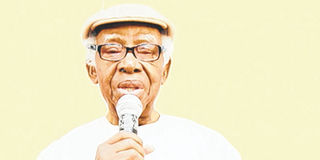MEET THE AUTHOR : The famous poet of Nun River

Nigerian poet and novelist Gabriel Okara. PHOTO \ COURTESY
What you need to know:
I went to government College Umuahia in the 1930s and 40s when secondary schools were really secondary schools and we were exposed to all branches of study, from the Sciences to the Arts.
Gabriel Okara is a Nigerian poet and novelist whose work has been translated into several languages. After his first poem, “The Call of the River Nun,” won many awards, several of his poems were featured in the Nigerian literary journal Black Orpheus. In his poetry, Okara draws from Nigerian folklore and religion while exploring extremes within daily life through circular patterns.
You are one of the pioneer Nigerian writers. How did the literary journey begin?
I went to government College Umuahia in the 1930s and 40s when secondary schools were really secondary schools and we were exposed to all branches of study, from the Sciences to the Arts. We were also exposed to various European writers and we were inspired by them. I began to think about my experiences in the environment in which I grew up. I grew up in the village of Bomoundi on the riverbanks where water was everything for us. We used it for cooking, washing, transportation; travelling from place to place.
It appears you prefer expressing yourself in poetry to other literary genres.
My choice of the genre in which to express myself at any given time depends on the themes and subject. If poetry will be more expressive I choose it. But sometimes I don’t even think of that; the thing just comes, like the way a song would come to a singer.
Rivers, which inspired some of your beautiful works, seem to be a curse to the people of the Niger Delta area now, considering the environmental pollution caused by the oil exploration. If you were to write about the same rivers now would it still be that exotic?
The pollution does not take place in all the rivers, not in the River Nun; it happens only where there are oil wells. But, of course, if I’m writing on the rivers today they will not be the same because the fact that some rivers are affected means that the condition is not the same as it was.
What you may likely write now is protest poetry to protest against the environmental degradation?
Oh yes. My recent poem, “River Nun (III)” is all about the rivers, but there are some changes to reflect the present realities.
Writers are said to be agents of change, but writers like you have been writing for many years and yet nothing seems to change especially in Nigeria - in fact, things seem to be getting worse. Why?
Writers express their own ideal society, the kind they would like to live in. And sometimes they forecast what the society in which they live will become in future. But everything depends on the leadership. While writers try to show the way, it is left for the leaders to bring about the physical development. It is the leaders, the governors, the president and others who are in government that can change the society through initiating policies for development and executing such policies. They are supposed to effect the physical changes like good roads etc. that affect the lives of the people. The kind of change that writers bring about is that of attitude.
Does this mean all the ideals forecast by the Nigerian writers will eventually come to pass?
Certainly, things will change for the better. No society is static. As the old writers pass away the young ones will take over the fight for change; it is a continuous fight. And change will come eventually.
But it appears the condition is getting worse…
Things normally get worse before they get better. The present situation is an indication of the changes to come. Everyone wants to get rich by all means. The means doesn’t matter; the end justifies the means.
The publishing climate in Nigeria today is not as it used to be in your days; it is unfavourable to the young writers. What factors do you think are responsible for this?
Many factors are responsible. In our days you won’t find local publishers. Our works were published abroad and brought back to the country. But today there are many publishers. And these could not be called real publishers because you have to pay before they publish your book. They call themselves publishers when they are mere printers.
So the problem is not lack of publishers but the style of publishing?
Yes, the problem is the style of publishing which is more like printing job. In real publishing you don’t pay publishers, they pay you in royalties. They sign agreement with you and you wait and get your royalties depending on the percentage agreed upon.
Are you still writing?
Yes.
What work are you working on now?
I don’t want to name the title now. But it is a novel and hopefully it will be out soon
What is your message to young writers?
Young writers should be patient. Practice makes perfect. They can’t just write anything and feel it is good enough for publishing.
Publishers are businessmen like any other businessmen in other trades.
They are not philanthropists; they are out to make money. So young writers should be patient and polish their works. When they are good, publishers will be running after them, they won’t have to go canvassing for publishers, they will run after them. They should be patient and be writing, if they have that desire and innate talent in them, it doesn’t matter how long it takes, it will come out.
Source: www.african-writing.com




